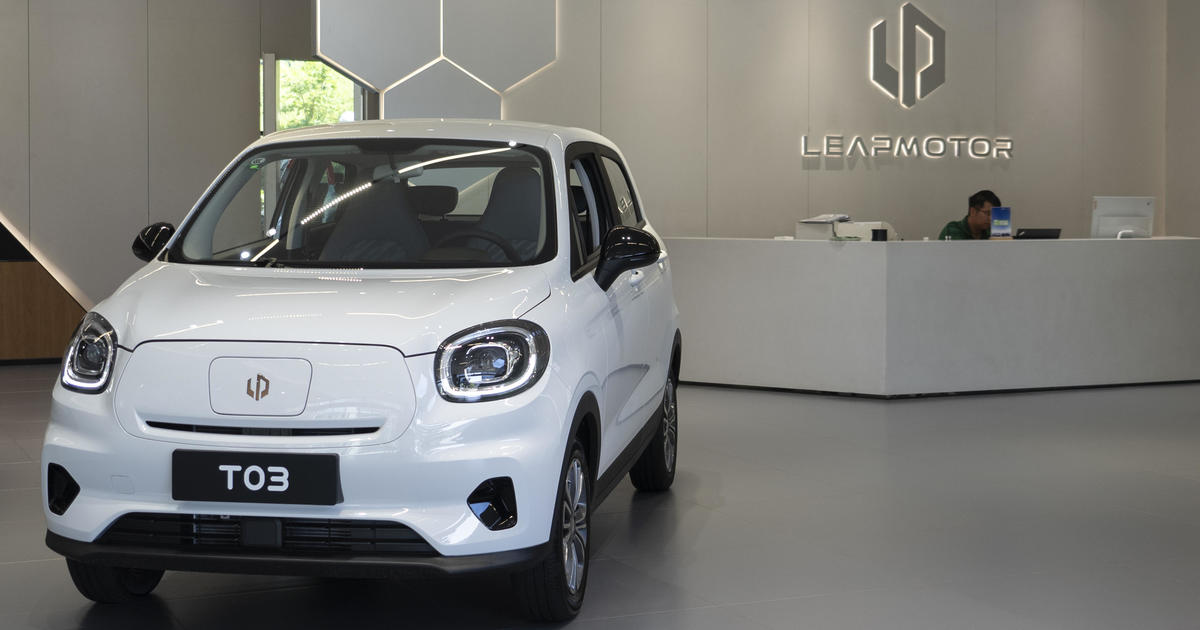
Biden’s Chinese EV tariffs don’t address national security concerns

President Biden’s move to quadruple tariffs on Chinese electric vehicles isn’t meant to head off any potential national security threats posed by internet-connected vehicles made in China, but some political leaders in the president’s own party think those concerns shouldn’t be overlooked.
The tariff hike was designed to keep China from undercutting U.S. automakers with a flood of EVs that cost a fraction of those produced by American companies. Sen. Sherrod Brown of Ohio and other Democrats have urged the president to ban Chinese EVs altogether because they fear Chinese-produced consumer devices could be used to hurt Americans through hacking or spying.
Brown’s state of Ohio is a major manufacturing hub for U.S. automakers, and he reiterated that plea after the tariff announcement.
Rep. Elissa Slotkin, a Democrat from Michigan, the nation’s automaking capital, has expressed similar concerns.
“Thousands of Chinese-made, connected vehicles coming into the country would give [the Chinese] a huge amount of data — high-fidelity data on things like U.S. military bases, key infrastructure facilities, like bridges and electric grid nodes, secretive locations, individual leaders,” she said in remarks on the House floor in early May.
Slotkin, a former CIA analyst who went on to serve as an intelligence and defense official in the Bush and Obama administrations, went on to say that she’s raised the issue with Defense Secretary Lloyd Austin, who she said agreed with her because it would give a potential adversary detailed information that could be used to target infrastructure or even U.S. leaders. She said the U.S. lacks any kind of national security-type lens to vet imported Chinese cars, including those produced in Mexico.
Some Republicans have supported tariff increases on Chinese-made electric vehicles, too, among them, Sen. Tom Cotton of Arkansas, who has long voiced concerns over TikTok, owned by the Chinese company ByteDance.
Mr. Biden on Tuesday announced tariffs on Chinese EVs will quadruple the current tariff rate of 25% to 100%, as the administration tries to keep China from undercutting U.S. companies and threatening union manufacturing jobs. Chinese automakers, with the backing of their government and cheap labor and supply, could flood western markets with vehicles as inexpensive as $10,000 to $12,000, about a third of the price of American EVs. But those prices would be higher in the U.S. because of the tariffs. Worldwide, Chinese company BYD overtook Tesla to become the world’s biggest electric car company in the last quarter of 2023.
There are few EVs produced in China that are currently sold in the U.S. The Chinese-backed Swedish automaker Volvo produces one of them, the Polestar. But Volvo only sold around 9,000 Polestars — out of the more than 812,000 EVs that were sold in the U.S. in 2022. Volvo is also rolling out another car, the EX30, that will be sold in the U.S. as early as this summer and is likely to have a relatively low price tag, in spite of the tariff hike.
The administration is trying to keep the U.S. from emulating Europe, where Chinese EVs quickly came to account for about 20% of the market share, but is not considering banning Chinese-made EVs.
Steve Weymouth, an associate professor at Georgetown University’s McDonough School of Business who studies the smart car industry, said the new tariffs address the economic aspect of national security, but don’t necessarily make inroads into privacy and spying concerns. Weymouth said Internet-connected vehicles collect data like speed and routes, “stuff you would imagine your insurance provider would want.” But they “also integrate the cameras and the microphones and other sensors in a way that can really increase surveillance capabilities,” he said.
During an Atlantic Council chat in January, U.S. Commerce Secretary Gina Raimondo warned that Chinese EVs pose serious national security risks, saying EV and autonomous cars collect “huge amounts of sensitive data” on drivers.
The cars “collect huge amounts of sensitive data on the drivers — personal information, biometric information, where the car goes,” Raimondo said. “So it doesn’t take a lot of imagination to figure out how a foreign adversary like China, with access to this sort of information at scale, could pose a serious risk to our national security and the privacy of U.S. citizens.”
There is another major factor that the government is concerned about, though.
“There are policies in China that require a company to share data with the Chinese government for specific reasons,” Weymouth said, unlike the U.S., which has safeguards like requirements for court-issued warrants for such information that “just aren’t present in China.”
The new tariff hikes stem from U.S. Trade Representative Katherine Tai’s years-long review of Trump-era tariffs on China under Section 301, which empowers the president to impose tariffs when a foreign government violates international trade agreements or unreasonably burdens U.S. commerce.
Her investigation concluded that China continues to use unfair business practices. In March, the president announced the Commerce Department would open a separate investigation into Chinese-made “smart cars,” citing national security risks.
“We don’t have a position on that specifically,” the senior administration official said of national security concerns. “I think this — these sets of actions are very much just focused on the 301 statutory review. That’s been completed, and they are narrowly focused on several tariffs that are important to protect workers and industry within the U.S. strategic sectors, as opposed to anything broader and larger for now.”
Kathryn Watson
Source: cbsnews.com